Best Zendesk Competitors for Self-Service Portal Excellence
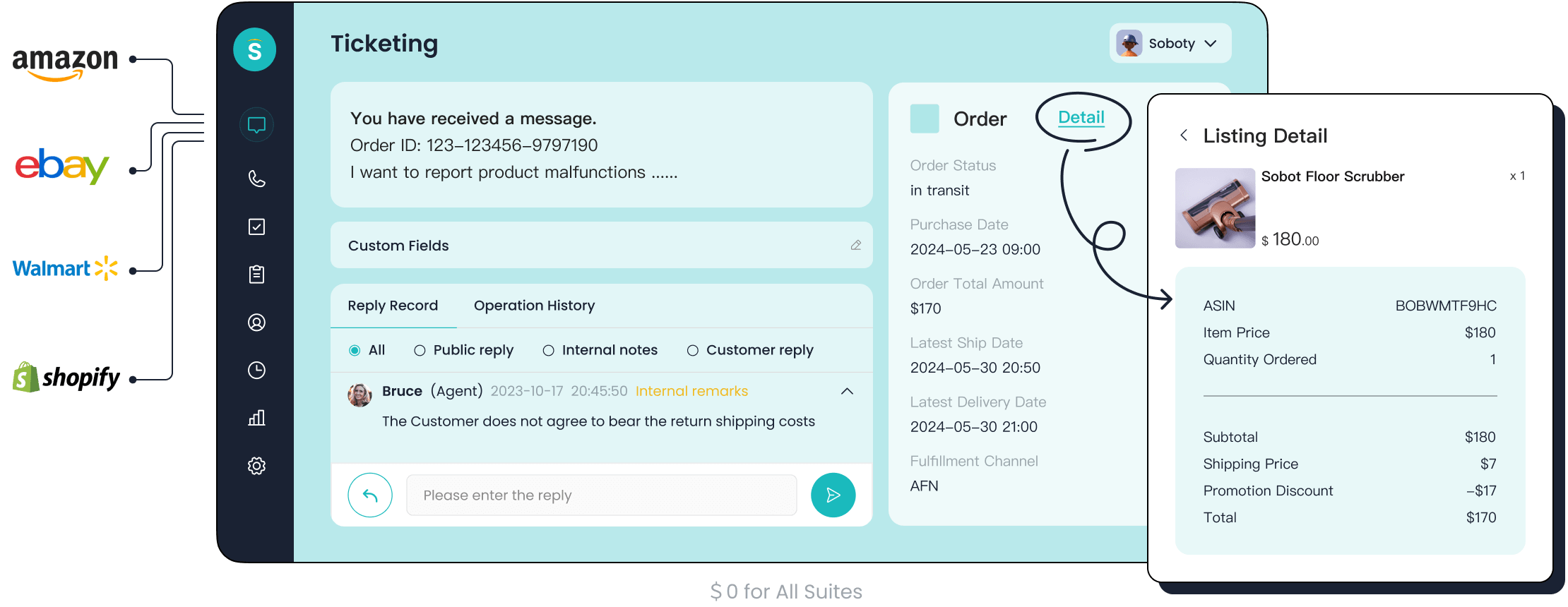
Businesses searching for the best Zendesk alternatives often prioritize a seamless self-service portal, cost efficiency, and robust integration. Sobot stands out with its AI-driven ticketing system, trusted by global brands for unified customer service. Sobot AI empowers teams to automate self-service support and manage high inquiry volumes. Self-service portals now play a vital role in customer service, helping companies resolve issues faster and boost satisfaction. Those asking who are Zendesk competitors find Sobot among the top choices for scalable, intelligent solutions.
Who Are Zendesk Competitors
Key Players Overview
Many businesses ask who are zendesk competitors when searching for reliable help desk software. The self-service portals market has seen rapid growth, with several companies leading the way. These key players include global technology providers and innovative software vendors. They offer solutions that help organizations manage customer service efficiently.
The market for help desk software reached $38.68 billion in 2023 and is projected to grow to $69.34 billion by 2032, with a CAGR of 6.7%. The ATM segment held the largest revenue share at 58.4% in 2022, while the retail segment accounted for 33.2%. Quick service restaurants are growing quickly, with a CAGR of 15.4%. Asia Pacific leads with a 38% revenue share and the fastest growth rate at 16.4%.
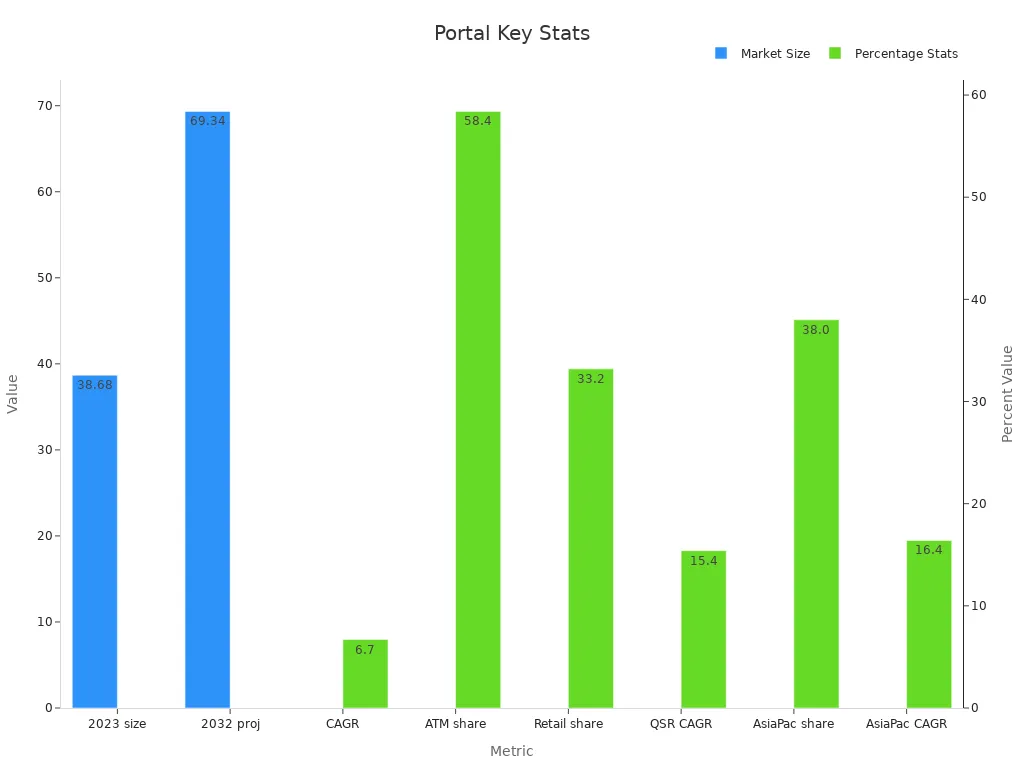
| Metric | Statistic |
|---|---|
| Market size in 2023 | USD 38.68 billion |
| Projected market size in 2032 | USD 69.34 billion |
| Compound Annual Growth Rate (CAGR) | 6.7% |
| ATM segment revenue share (2022) | 58.4% |
| Retail segment revenue share (2022) | 33.2% |
| Quick Service Restaurant segment CAGR | 15.4% |
| Asia Pacific regional revenue share (2022) | 38.0% |
| Asia Pacific regional CAGR | 16.4% |
Sobot stands out as a trusted provider of help desk software, offering unified channel management and AI-powered automation. Its solutions support diverse industries, helping brands like OPPO and Samsung deliver excellent customer service.
Why Businesses Seek Alternatives
Organizations often wonder who are zendesk competitors because they need help desk software that fits their unique requirements. Many companies look for alternatives due to pricing, integration needs, or a desire for more advanced automation. Some businesses want self-service portals that can handle high volumes of requests without sacrificing quality.
Sobot addresses these needs with its all-in-one help desk software. It provides seamless integration with email, chat, and e-commerce platforms. The system automates ticket routing and supports multilingual service, making it ideal for global brands. Companies also value analytics and SLA management, which help improve customer service outcomes. As the market grows, more organizations seek flexible, scalable solutions that empower both agents and customers.
Sobot Ticketing System for Self-Service Portals
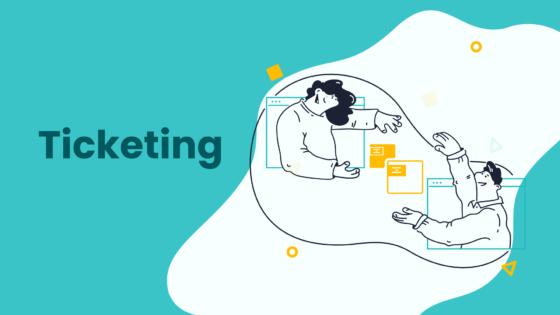
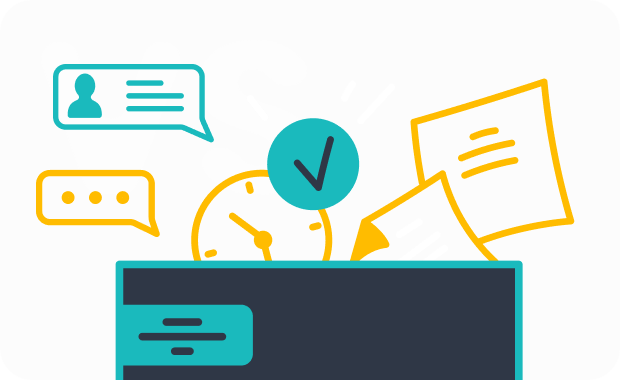
Unified Channel Management
Sobot’s ticketing systems provide unified channel management for businesses that want to streamline customer interactions. The platform brings together email, chat, voicemail, and e-commerce channels into a single workspace. This approach helps teams manage all customer inquiries efficiently. Agents can view every ticket and customer detail in one place, which improves client management and reduces response times. Companies in retail, finance, and technology use Sobot’s customer service platform to keep communication organized and consistent. This unified system supports higher customer satisfaction by ensuring no request gets lost or delayed.
AI and Automation Features
Sobot’s ai-powered platform uses automation to handle repetitive tasks and route tickets to the right agents. The system creates tickets automatically, assigns priorities, and sends smart notifications. AI-driven workflows help agents focus on complex issues while the platform manages routine requests. Businesses benefit from faster resolutions and improved self-service support. Sobot’s ticketing systems also offer SLA management, which ensures teams meet response and resolution targets. These features help companies maintain high customer satisfaction and deliver reliable service at scale.
Multilingual and Analytics Capabilities
Sobot supports multilingual ticketing, allowing customers to submit requests in their preferred language. Recent research shows that convenience is a key factor driving the use of multilingual self-service systems, which leads to better customer experience and higher customer satisfaction. Sobot’s analytics tools provide real-time insights into ticket trends, agent performance, and customer feedback. Managers use these analytics to identify areas for improvement and optimize service delivery. The combination of multilingual support and analytics helps businesses serve global audiences and maintain high standards.
Customer Success Story: OPPO
OPPO, a global leader in smart devices, improved its customer satisfaction by partnering with Sobot. During peak shopping periods, OPPO faced a surge in inquiries. Sobot’s ticketing systems and chatbot handled repetitive questions, freeing agents to solve complex problems. The company saw an 83% chatbot resolution rate and a 94% positive customer feedback rate. OPPO also reduced knowledge base maintenance by 90%. These results show how Sobot’s solutions drive customer satisfaction and support business growth across industries.
Best Zendesk Alternatives for Self-Service Portals
Freshdesk
Freshdesk appears frequently in lists of the best Zendesk alternatives. Many businesses choose this help desk software for its simple ticketing and basic automation. However, usage statistics show that Freshdesk often underperforms in key areas. Companies switching from Freshdesk to other platforms report a 27% decrease in average handle time and a 15% increase in admin productivity. Customer satisfaction scores also rise by 5% after switching. Users mention that Freshdesk’s interface can feel disjointed, with multiple tabs for different channels. This setup slows down agents and makes it harder to scale operations. Freshdesk works well for small teams that need basic help desk software, but larger organizations may find it less suitable for integrated, scalable customer service.
| Metric / Feature | Zendesk Performance | Freshdesk Performance |
|---|---|---|
| Average Handle Time | 27% decrease when switching from Freshdesk | Higher average handle time |
| Admin Productivity | 15% increase when switching from Freshdesk | Lower productivity |
| Customer Satisfaction (CSAT) | 5% increase when switching from Freshdesk | Lower CSAT scores |
| User Experience | Intuitive, centralized Agent Workspace | Disjointed, multiple interfaces per channel |
| Real-time Speed | Fast, scalable, AI-powered | Slower at scale, basic analytics |
| Workforce Management & QA | Native intelligent WFM and QA solutions | Lacks native intelligent WFM and QA |
| Scalability | High scalability | Limited scalability |
| Customer Feedback Examples | Positive improvements in speed and visibility | Issues with multiple tabs, slow updates |
Note: Freshdesk is best for teams seeking basic ticketing and simple workflows, but it may not meet the needs of businesses requiring advanced customer support tool features or high scalability.
Help Scout
Help Scout stands out for its focus on customer experience and ease of use. Many small and medium-sized businesses select Help Scout as their help desk software because of its intuitive design and strong self-service portal. The Docs feature, Help Scout’s knowledge base functionality, operates 24/7. Customers can resolve issues at any time, which boosts satisfaction. Users can create articles with images and keywords, making information easy to find. Help Scout receives high ratings, with 4.4 out of 5 stars on G2 and 4.6 out of 5 on Capterra. Customer testimonials praise its effectiveness as a ticketing and support system. Help Scout works well for companies that want a simple, reliable client portal software with strong self-service options.
- Help Scout’s Docs knowledge base runs around the clock, helping customers solve problems after hours.
- The Docs feature supports multimedia and keyword optimization, improving the self-service experience.
- User ratings remain high across review platforms.
- Customers highlight Help Scout’s positive impact on satisfaction and support efficiency.
Zoho Desk
Zoho Desk offers a wide range of help desk software features, but some users find the platform harder to learn. The interface can feel less intuitive, which slows adoption for new teams. Zoho Desk includes basic AI tools, but these require manual setup and do not offer advanced voice capabilities. Reporting and analytics remain limited compared to other customer service software. Integration options exist, but the marketplace is smaller and setup can be complex. Zoho Desk works best for organizations already using other Zoho products. Businesses looking for advanced analytics, easy adoption, or high customization may want to explore other best Zendesk alternatives.
| Aspect | Zendesk | Zoho Desk |
|---|---|---|
| Learning Curve & Adoption | Easy, quick setup | Steep, less intuitive |
| AI Capabilities | Advanced, out-of-the-box | Basic, manual setup |
| Reporting & Analytics | In-depth, customizable | Basic, limited |
| Integrations | 1,700+ apps, seamless | Limited, complex |
| Scalability | High, customizable | Limited |
| User Experience | Intuitive, fast | Less intuitive |
| Voice Support | AI-powered, built-in | Third-party only |
| Support & Expertise | CX-focused, strong | Broader suite |
Tip: Zoho Desk fits companies that already use Zoho’s suite and need basic help desk software, but it may not suit those seeking advanced customer service or analytics.
Intercom
Intercom provides a conversational approach to customer support. The platform uses chatbots and messaging to help businesses engage with customers in real time. Many startups and SaaS companies choose Intercom for its modern interface and automation features. Intercom’s help desk software includes live chat, targeted messaging, and a customizable self-service portal. However, some users mention that costs can rise quickly as teams grow or as more features are added. Intercom works best for companies that prioritize chat-based support and want to automate simple customer interactions. For businesses needing a unified omnichannel solution, Sobot offers a more integrated approach with AI-powered automation and analytics.
Salesforce Service Cloud
Salesforce Service Cloud ranks among the best Zendesk alternatives for large enterprises. The platform integrates with the broader Salesforce ecosystem, making it a strong choice for companies already using Salesforce products. Service Cloud offers robust help desk software features, including case management, automation, and advanced analytics. The platform supports a wide range of channels, such as phone, email, and chat. Businesses can customize workflows and integrate with third-party tools. However, the complexity and cost may not suit smaller organizations. Companies seeking a scalable, enterprise-grade customer service solution often consider Salesforce Service Cloud. For those who want a flexible, AI-driven platform with unified channel management, Sobot provides a compelling alternative.
Note: Sobot delivers a unified self-service portal, multilingual support, and seamless integration with e-commerce platforms, making it a strong choice for businesses of all sizes seeking efficient customer support tools.
Comparing Self-Service Portals

Feature Comparison Table
Businesses often compare self-service portals by looking at features that impact customer experience and efficiency. The table below highlights key features across leading platforms, including Sobot’s ticketing system. Sobot stands out with unified channel management, AI-powered automation, and strong multilingual support. Many companies value knowledge base functionality, as it helps customers find answers quickly and reduces agent workload.
| Feature | Sobot | Zoho Desk | Help Scout | Salesforce Service Cloud |
|---|---|---|---|---|
| Unified Channel Management | ✅ | ✅ | ❌ | ✅ |
| AI Automation | ✅ | Limited | ❌ | ✅ |
| Multilingual Support | ✅ | ✅ | ❌ | ✅ |
| Analytics & Reporting | ✅ | Basic | Basic | Advanced |
| SLA Management | ✅ | ✅ | ❌ | ✅ |
| Knowledge Base Functionality | ✅ | ✅ | ✅ | ✅ |
| E-commerce Integration | ✅ | ❌ | ❌ | ✅ |
Tip: Companies should review customer feedback to see how each platform performs in real-world scenarios.
Pricing Overview
Pricing for self-service portals varies by platform and features. Most providers use a per-agent model, with some offering free or custom plans for different business sizes. Sobot offers flexible pricing to support both small businesses and large enterprises. The chart below shows starting prices for popular platforms.
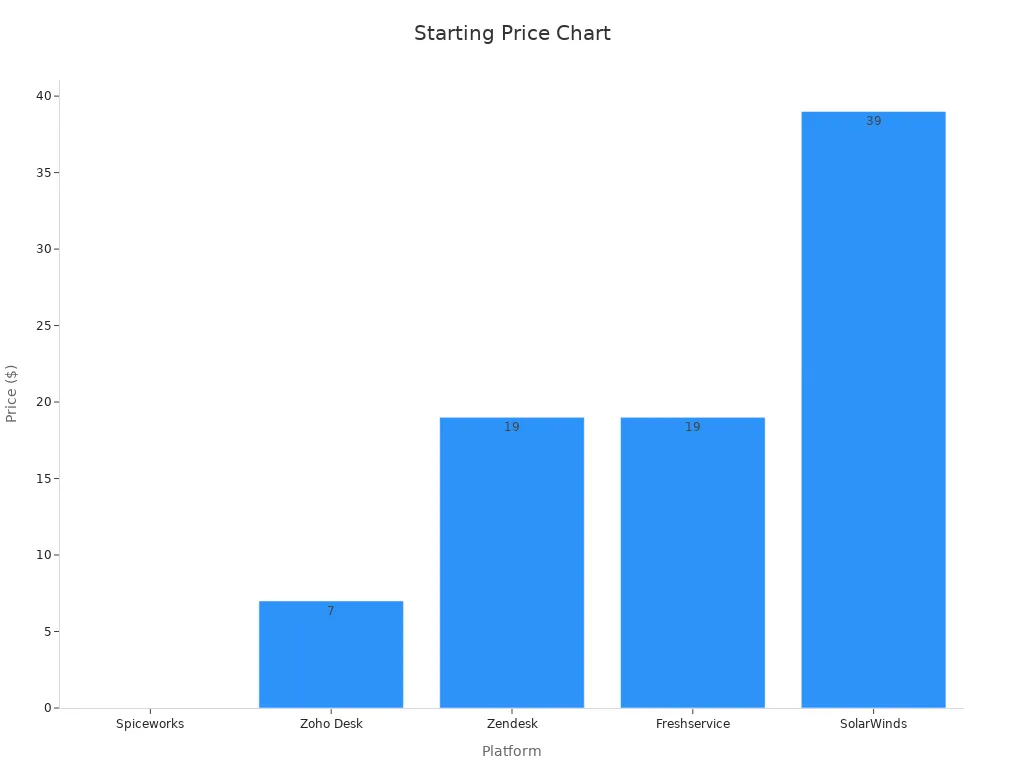
| Platform | Pricing Model | Price Range (per agent/month) | Notes |
|---|---|---|---|
| Sobot | Custom | Contact sales | Scalable, tailored to business needs |
| Zoho Desk | Per-agent | $7 - $35 | Free plan for up to 3 agents |
| Help Scout | Per-agent | $20 - $65 | Simple plans, easy to scale |
| Salesforce SC | Per-agent | $25 - $300 | Advanced features, higher cost |
Note: Trends show a move toward cloud-based, AI-powered solutions with flexible pricing for different needs.
Best Fit by Business Type
Selecting the right self-service portal depends on business size, industry, and support needs. Sobot fits companies seeking unified customer service, advanced automation, and global reach. Retailers, financial services, and tech firms benefit from Sobot’s multilingual support and analytics. Help Scout works well for small teams focused on customer feedback and simple workflows. Zoho Desk suits businesses already using Zoho products. Salesforce Service Cloud targets large enterprises needing deep customization.
- Sobot: Best for growing businesses needing scalable, AI-driven support.
- Help Scout: Ideal for small teams prioritizing customer feedback.
- Zoho Desk: Fits companies using the Zoho ecosystem.
- Salesforce Service Cloud: Suits large enterprises with complex needs.
Companies should consider customer feedback, integration needs, and budget when choosing a platform.
Choosing the Right Zendesk Alternative
Assessing Business Needs
Businesses should start by identifying their unique requirements before selecting a customer service platform. Factors such as company size, industry, and support volume play a crucial role. Many organizations face challenges like escalating costs, technical complexity, and limited customization. Modern customer service demands omnichannel support, automation, and mobile accessibility. Companies should also look for cloud-based solutions that offer collaboration and advanced analytics.
Industry experts recommend using several benchmarks to assess needs:
- Quantitative metrics, such as customer satisfaction scores and support volume.
- Branded benchmarks, including market share and regional performance.
- Ratings and reviews from platforms like Google and Facebook.
- Combining customer experience data with benchmarks to drive improvements.
Tip: Businesses that regularly review these benchmarks can better align their customer service software with operational goals.
Key Features to Consider
When evaluating a customer service platform, companies should focus on features that drive efficiency and satisfaction. The following table highlights key performance indicators for self-service portals:
| KPI Name | What it Measures | Why it Matters |
|---|---|---|
| Self-service success rate | Percentage of users resolving issues without tickets | Shows how well the portal reduces support tickets and saves costs |
| Knowledge item usefulness rating | User feedback on knowledge articles | Indicates content quality and relevance |
| Average time spent per item | Time users spend reading articles | Reveals if content is clear and engaging |
| Percentage of items recently updated | Freshness of content | Ensures information is current and reliable |
| Knowledge item coverage vs requests | Alignment of content with user needs | Measures if the knowledge base addresses frequent support issues |
Sobot’s customizable client portals excel in these areas, offering AI-powered automation, multilingual support, and real-time analytics to help businesses improve customer service outcomes.
Integration and Scalability
Integration and scalability are essential for any modern customer service platform. Companies need solutions that connect with existing tools and grow with their operations. For example, platforms like Sobot support integration with e-commerce systems and communication channels, ensuring seamless workflows. Scalable solutions allow businesses to add new features, manage more agents, and handle increased support volume without sacrificing performance.
Recent advancements in cloud-native architecture and AI-driven enhancements enable platforms to support hybrid environments, multi-directory management, and predictive analytics. These capabilities help organizations maintain high-quality customer service as they expand.
Budget Considerations
Budget remains a key factor when choosing customer service software. Companies should compare pricing models, starting costs, and available features. Some platforms offer flexible plans or custom pricing to fit different business sizes. Sobot provides scalable pricing options, making it accessible for both small businesses and large enterprises.
Note: Aligning budget with essential features ensures companies get the best value without overspending. Always consider long-term growth and the potential need for advanced features.
Selecting the right self-service portal shapes customer satisfaction and business growth. Sobot delivers unified channel management, AI automation, and multilingual support, driving customer satisfaction for brands worldwide. The table below shows how leading alternatives fit different needs:
| Alternative | Best For |
|---|---|
| Sobot | Scalable, AI-driven customer satisfaction |
| Help Scout | Simple customer service for small businesses |
| Zoho Desk | CRM integration and automation |
| Salesforce Service Cloud | Enterprise analytics and customer satisfaction |
Companies should review their customer service goals, test free trials, and choose a platform that maximizes customer satisfaction. Explore Sobot for a modern approach to customer service excellence.
FAQ
What features set Sobot apart from other Zendesk competitors?
Sobot offers unified channel management, AI-powered automation, and multilingual support. Over 10,000 brands trust Sobot for its 99.99% system stability and seamless integration with e-commerce platforms. These features help Sobot stand out among Zendesk competitors.
Learn more: Sobot Ticketing System
How do Zendesk competitors improve self-service portal efficiency?
Zendesk competitors use automation, knowledge bases, and analytics to reduce response times. For example, Sobot’s AI-driven workflows help agents resolve tickets faster. OPPO achieved an 83% chatbot resolution rate after switching to Sobot, showing real-world efficiency gains.
Can Sobot integrate with e-commerce platforms like Shopify?
Yes, Sobot integrates with Shopify and other e-commerce platforms. This integration allows businesses to manage customer inquiries from multiple channels in one place. Many Zendesk competitors lack this level of seamless e-commerce integration.
Why do businesses choose Zendesk competitors for customer support?
Companies often select Zendesk competitors for better pricing, advanced automation, and flexible integration. Sobot’s scalable solutions fit both small businesses and large enterprises. Brands like Samsung and Luckin Coffee rely on Sobot for reliable customer service.
How do Zendesk competitors support global customer service?
Zendesk competitors like Sobot provide multilingual ticketing and analytics. Sobot supports customers in over 60 countries and offers real-time translation. This helps businesses deliver consistent service worldwide and meet diverse customer needs.
Tip: Always review customer feedback and real-world results when comparing Zendesk competitors for your business.
See Also
The Leading Customer Support Software Solutions For 2024
Best Live Chat Platforms Compared: Shopify And Alternatives
2024 Reviews Of The Best Cloud Contact Center Services
